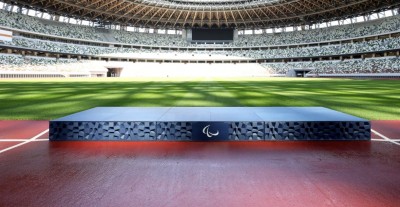
Tokyo, While it's a known fact that the medals for the Tokyo Olympics and Paralympic Games have been minted from metals extracted from discarded mobile phones and laptops, few would know that the podiums were created using 24.5 tonnes of recycled household plastic waste.
On Friday, the Tokyo2020 Twitter page posted an article detailing the "victory ceremony at the #Tokyo2020 #Paralympics", which said that, "The podiums were created using 24.5 tonnes of recycled household plastic waste, which was donated by people across Japan to show how sustainability in society can be achieved.
"Waste material was also used to make the symbols embedded along the sides. Designer TOKOLO Asao, who also created the Tokyo 2020 emblem, based it on the traditional Japanese chequered pattern, ichimatsu moyo, used aluminium recycled from temporary housing provided in the regions affected by the 2011 Great East Japan Earthquake," the Tokyo Games organisers explained.
As for the medals for the Paralympic athletes, the organisers mentioned that the design of the medals was based on the idea that to achieve glory, athletes must strive for victory on a daily basis.
"They (medals) resemble rough stones that have been polished and shined with 'light' and 'brilliance' to symbolise the energy of the athletes and those who have supported them, as well as the warm glow of friendship. The medals also represent diversity and show how people who compete in sports and work hard are honoured."
The Japanese government had to launch a two-year nationwide campaign to collect ample recycled material for the production of 5,000 bronze, silver, and gold medals for the Tokyo Olympics and Paralympic Games.
While the concept of making medals from discarded laptops, mobile phones and other electronic commodities is not new, the Japanese took it to an altogether different level, enlisting the support of nearly 90 per cent of the country's cities, towns and villages.
In the end, the country was able to produce 32kg of gold, 3,492kg silver and approximately 2200kg of bronze from nearly 80 tonnes of electronic devices, which then went into the crafting of the glittering Olympic medals.


.jpeg)

